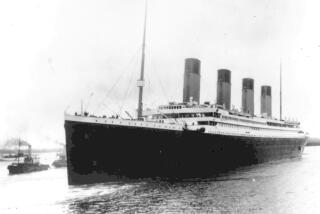Claim of deep-sea treasure called murky
Deep-sea treasure hunters said Friday that they had recovered what could be a record haul of gold and silver coins from a colonial-era shipwreck -- but their failure to provide many details has set off a galleon-sized controversy over their claims.
The hunters from Odyssey Marine Exploration Inc., a Tampa, Fla.-based company, said their haul had so far totaled about 17 tons of coins, more than 500,000 in all.
Each coin could bring between a few hundred and several thousand dollars, according to an expert who evaluated some of them at the company’s request. If the coins were worth an average of $1,000 each, the total could reach $500 million, which would make it one of the most valuable sunken treasures ever discovered.
But some experts in nautical archeology were quick to cast doubt on the value of the booty.
“There is no such thing as $500 million on any wreck in the world,” said Robert Marx, a veteran treasure hunter. “Anybody who says so is ... lying.”
George Bass, an archeologist at Texas A&M; University who specializes in shipwrecks, said he was skeptical of these types of early estimates, especially when so little information had been provided by the company.
“Very often it’s exaggerated, because of course they need to get financial backers,” he said.
Odyssey Marine Exploration is unusual in the treasurehunting world: It is a company whose stock is publicly traded on the American Stock Exchange.
On Friday, its shares, which had been hovering around $4.60, shot up 80% to close at $8.30. It rose to $8.94 in after-hours trading.
Odyssey co-founder Greg Stemm said the company was being “relatively secretive” while it confirmed the identity of the ship.
A spokeswoman for the company stressed that because Odyssey was publicly traded, it could not distort the value of its discovery.
“If we were to inflate the value of a find like that, we would be in serious trouble,” said Laura Barton, vice president of communications.
Since September, the company has filed a series of motions in U.S. District Court for the Middle District of Florida seeking the rights to an “unidentified, shipwrecked vessel.”
The documents say the wreck was found last summer 40 miles off the southwestern tip of England. The ship was a 17th century merchant vessel equipped with cannons.
Stemm would not say whether the filings referred to the new discovery.
The company announced the find with scant details, explaining that the wreck was found in international waters somewhere in the Atlantic. They code-named the site Black Swan.
Stemm said historical records showed that several ships sank in the same region.
The treasure was found using a deep-sea robot equipped with cameras.
The company provided a photograph of hundreds of large white plastic buckets stacked on wooden pallets in a warehouse. Each bucket is numbered and labeled with the weight of its contents. In the foreground, an 18-kilogram bucket is open to reveal shiny silver coins.
Rare-coin expert Nick Bruyer recently traveled to inspect the coins as they were going through the conservation process and declared the size of the find “unprecedented.” The coins spanned several decades and were exceptionally well preserved, he said.
After examining dozens of them, he concluded that some could be worth as much as $4,000. The finest specimens “could bring record-breaking prices,” said Bruyer, founder of Asset Marketing Services, Inc. in Burnsville, Minn., who has done work for Odyssey in the past.
Bruyer and Stemm refused to give the nationalities of the coins, but Odyssey has already begun marketing them on www.blackswanshipwreck.coma special website.
It is not the first discovery for the company. Odyssey Marine Exploration was founded in 1994 by Stemm and John Morris, who believed that modern technology would make it possible to recover valuable shipwrecks in deep waters, where they had been largely undisturbed for hundreds of years.
The company went public in 1997, using money from investors to finance its discovery efforts.
Progress was slow, but in 2002 the company signed an agreement with the government of the United Kingdom to explore the wreckage of the Sussex, an English warship that sank off the coast of Gibraltar in 1694. The gold onboard has been estimated to be worth hundreds of millions. Odyssey and the British government will split any proceeds.
In 2003, the company began to recover coins from another wreck, the steamship Republic, which sank off the coast of Georgia in 1865. Odyssey has sold a third of the coins so far for a total of $33 million, Stemm said.
Still, the company lost $19 million last year, according to a filing with the Securities and Exchange Commission. Stemm said it cost $1.5 million a month to keep Odyssey’s research vessels working.
Black Swan could put the company way into the black -- and into the record books. The biggest previously reported find was the 1985 discovery of Nuestra Senora de Atocha, a Spanish galleon loaded with gold, silver, gems and jewelry that sank off the coast of Florida in 1622. When it was located by famed treasure hunter Mel Fisher, the value of its cargo was estimated at $400 million.
But that figure is also hazy. Fisher’s company is private and has never disclosed how much it has actually brought in, according to Bass, the archeologist.
Treasure hunting is by nature a secretive world, comprising a handful of companies.
“In this business, we all hold our cards pretty close to the chest,” said Scott Heimdal, president of RS Operations, a treasure-hunting company based in Peoria, Ill.
Even by those standards, Odyssey is withholding more than usual, critics said.
“So much is kept secret it is hard to know what they have,” Bass said.
Marx, who has written dozens of books about shipwrecks, said Odyssey could have disclosed a rough location and date of the wreck and the nationality of the coins to satisfy skeptics without jeopardizing the find.
He also raised the issue of whether competing legal claims for the treasure could emerge. International laws governing shipwrecks are complex and in many cases give rights to the countries that originally owned the vessels.
Stemm said the company was well within its rights to scoop up those tons of coins before all the legal questions were settled.
He compared the situation to finding a wallet filled with cash but lacking identification to trace its owner.
“Do you have a right to pick that up and bring it to the police station?” he said. “That’s the same thing. We were walking along and we found a wallet with 17 tons of silver.”
More to Read
Sign up for Essential California
The most important California stories and recommendations in your inbox every morning.
You may occasionally receive promotional content from the Los Angeles Times.












